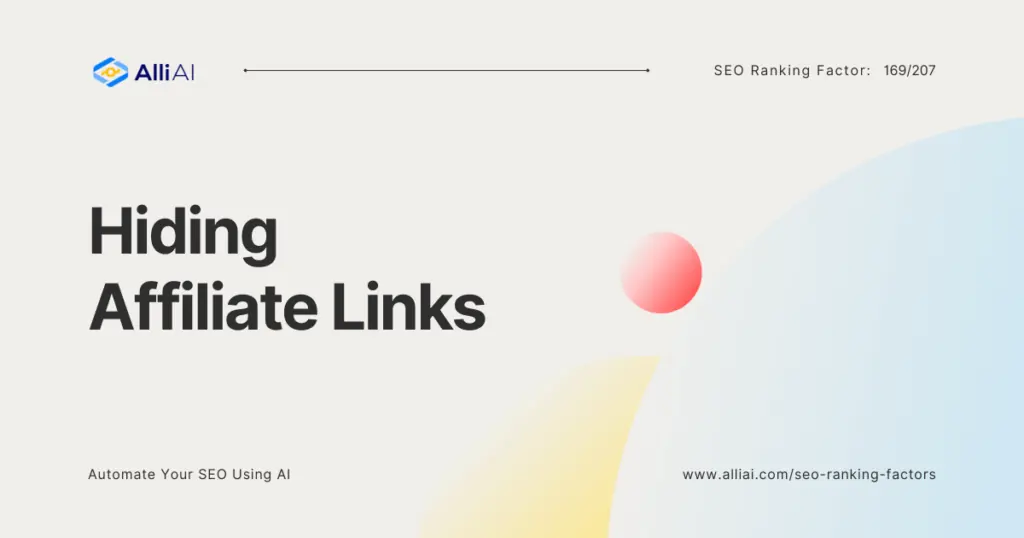Explanation of Hiding Affiliate Links
To understand hiding affiliate links, let’s consider a real-life analogy: Imagine you’re recommending a book to a friend. Instead of giving them a long, complicated library catalogue number to find the book, you simply give them a map or a direct, simple code to locate it. This doesn’t change the fact that you’re recommending the book, but it makes it easier for your friend to find it without navigating the complex catalogue.
In the digital world, hiding affiliate links works similarly. Instead of presenting the user with a long, often complex URL filled with tracking codes and affiliate identifiers, a website owner might use a cleaner, simpler link that redirects to the affiliate product. While the end destination (the book in the analogy) remains the same, the path to get there is made more user-friendly.
Why Hide Affiliate Links?
Hiding affiliate links serves two main purposes in search engine optimization (SEO):
Enhanced User Experience: Long, cumbersome affiliate links can appear spammy and deter users from clicking. Cloaked links, on the other hand, are visually appealing and inspire trust, potentially leading to higher click-through rates.
Link Management: Cloaking allows for easier management and tracking of affiliate links. If an affiliate program changes its link structure, updating a single cloaked link is simpler than modifying multiple instances of the raw affiliate URL.
Link Protection: Cloaking can offer some protection against link hijacking, where malicious actors replace your affiliate ID with their own to steal commissions.
Why is Hiding Affiliate Links Important in SEO?
Hiding affiliate links does not inherently harm SEO. In fact, it can positively impact a site’s performance if it leads to a better user experience. Google’s algorithms prioritize user value, and a seamless, transparent redirection process aligns with these goals.
Google’s sophisticated algorithms can detect and evaluate hidden affiliate links. Adherence to Google’s Webmaster Guidelines is essential to avoid penalties. According to these guidelines, transparency with your audience about the nature of affiliate links is crucial. Ethical redirection practices, such as using JavaScript or server-side techniques to simplify URLs, should enhance site usability without deceiving users.
How Hiding Affiliate Links Affects SEO
While link cloaking offers benefits, it’s essential to be aware of its potential SEO implications:
Google’s Stance: Google doesn’t inherently penalize link cloaking, but it does advocate for transparency and discourages deceptive practices. Cloaking that misleads users or manipulates search rankings can lead to penalties.
Nofollow Attribute: When cloaking affiliate links, using the “nofollow” attribute is recommended. This signals to search engines not to pass link equity to the destination URL, preventing any potential for link schemes.
User Trust: Transparent disclosure of affiliate relationships fosters trust with your audience. Clearly stating that a link is an affiliate link, even when cloaked, aligns with ethical marketing practices and FTC guidelines.
Best Practices for Ethical Affiliate Link Cloaking
Prioritize User Experience: Ensure that cloaked links are easy to read, understand, and relevant to the surrounding content.
Use Reliable Tools: Opt for reputable link cloaking tools or plugins that offer secure redirects and customization options.
Disclose Affiliate Relationships: Always disclose that you may earn a commission from linked products. This transparency builds trust and complies with regulations.
Avoid Over-Cloaking: Don’t cloak every link on your site. Reserve cloaking for affiliate links while leaving other links in their natural state.
Monitor Performance: Track the performance of your cloaked links to assess their effectiveness and make necessary adjustments.
Practical Implementation: A Step-by-Step Guide
- Identify the affiliate links that would benefit from simplification based on user engagement metrics.
- Choose the appropriate redirect method based on the permanence of the link and SEO considerations.
- Implement the redirects technically, either via .htaccess for Apache servers, server configurations for NGINX, or through JavaScript for client-side redirection.
- Test the redirects to ensure they work correctly and monitor the impact on site performance and user engagement.
- Disclose the use of affiliate links clearly to comply with legal standards and maintain user trust.
By adopting these practices, you can enhance both the usability and the SEO performance of your website while adhering to ethical standards and legal requirements.
FAQ
Does hiding affiliate links affect my site’s trustworthiness with Google?
Hiding affiliate links in itself won’t directly affect your site’s trustworthiness with Google as long as you’re not deceiving users. It’s crucial to adhere to Google’s Webmaster Guidelines, ensuring a high-quality user experience by providing clear, valuable content and disclosures about the nature of your affiliate links.
Are there best practices for hiding affiliate links?
Yes, use URL shorteners wisely, prefer server-side redirects, and always maintain transparency with your audience by disclosing that you’re using affiliate links. This can help retain trust and ensure compliance with guidelines from search engines and regulatory bodies.
Can I get penalized for hiding affiliate links incorrectly?
If Google views your method of hiding affiliate links as deceptive or manipulative, it could potentially lead to penalties. The key is to balance user experience, transparency, and adherence to SEO best practices.
Conclusion
In conclusion, hiding affiliate links is a nuanced strategy that can have beneficial effects on user experience and click-through rates when executed properly. However, the importance of transparency and ethical practices cannot be overstated. As search engines continue to evolve, focusing on providing value and a quality user experience remains paramount. By adopting best practices for hiding affiliate links, while keeping in line with SEO guidelines and maintaining honesty with your audience, you can enhance both your site’s usability and its SEO performance.






